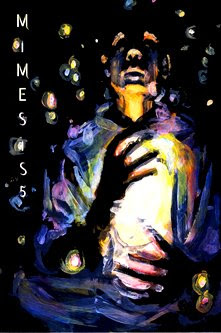I feel dreadful because I've been so busy posting on my POETS ON FIRE blog that I haven't been posting here on RAW LIGHT. This is not very good and accordingly I shall make amends by writing the following:
a.) Having finally got hold of a copy of Alice Oswald's
Woods etc., I've been reading it with, at first, incredulity and, after a while, great interest. Although it seems at first glance like a collection containing all the usual suspects - stone, river, moon, stars, woods
etc. - this book actually indicates a huge progression by Oswald as she swings even further along the line Hughes was beginning to take in his later 'nature' books, for want of a better description, such as
Cave Birds and
River, both of them marvellous books which slipped restlessly and ambitiously away from the mainstream wherever possible. It's a line I suppose could be described in places as working within the modernist or avant-garde traditions, but which in strong and rather eccentric hands like those of Hughes and Oswald becomes something uncategorisable. I wasn't sure of it, as I said before, at first, but then I think you get used to the voice and begin to trust it, allowing Oswald to lead you into darker and less obvious waters where you - or at least I - can see new possibilities for language and old possibilities given a new twist.
There are moments in Oswald's latest book when I want to kick her - a slavish homage to Hughes' Wodwo, for instance, which seems to add nothing new and should never really have got past the editor - but there are other moments, too numerous to mention, when I was fascinated enough to want to stop reading Oswald's poems and start writing something of my own. And when that happens, you know this has to be the real thing - poetry.
Perhaps that's the real test of poetry; not Astley's hairs rising on the back of his neck, or Schmidt cutting himself shaving, but a restless urge to write, to test yourself against that reaction, to go one better. That's certainly how Harold Bloom would see it ... if you believe in that sort of thing.
b.) After a silence of nearly five years, my work has at last appeared again in the pages of a poetry magazine - this quarter's issue of Poetry Review, in fact, just published this week. This five year absence from publication was due to a combination of writer's block - which seemed at the time more like writer's death than block - and an abrupt failure of nerve, which went hand in hand with the block and effectively prevented me from submitting even previously written work to poetry magazines. The poem that's just appeared in Poetry Review is a direct response poem to a magazine rejection - 'Deciphering the Rejection Letter' - which is sort of ironic, I know, but it does make me feel better to know I've finally broken the silence.
c.) And to finish off this blog entry, and make up for so many days of not bothering to post, here is a four poem sequence of mine, inspired by the elements and published in the excellent poetry magazine Acumen back in the late 90s:
ELEMENTALS
1
West Kennett Long BarrowStone womb under an earth belly
too ancient for light.
Rain condenses its euphoric mass
to a single blessing
filtering through
the intestinal silence of rock.
Flies cling
to the mossed edge of a crevice.
She devours their small bodies like offerings.
Once, she could hold her face
up to the moon, watch it
screwing a thin silver bolt
through the deadeye.
Now she eats beetles
and hunts with the night-train
passing the lit windows of women
anxious for conception.
II
Almost IcelandThe house was a standing stone
on the edge of annihilation.
It sat there uncomplaining
while acres of wind
pummelled and rattled windows
and floorboards.
The sea birds shunned it. The bees
rarely came so far north.
The sheep called out to it to move
but it didn’t.
It just sat there.
Its single chimney grinned up at the sky
like a maniac.
For miles around, whole islands lay down
and withered. Stones
stunted themselves in its shadow.
And always the wind
hammering for the house
to be absent.
Finally, its inhabitants packed up
and left.
The house remained,
folding its arms and gritting black teeth.
It had no intention of surrender.
The wind blew on
battering its ram’s head repeatedly
against lintels and uprights
its high battle-cry
prising tiles from the roof
imploding
the senseless resistance of doorways.
III
Holy IslandPausing
after the genuflection of causeway
salt water puckers a scar
the width of her belly
creased abdomen
folding a damp cloth into sand dunes.
Whatever she gave birth to
dragged itself beyond these coarse grasses
then sloped into wind-blear
turning its back
irascibly on civilisation.
Yet the marks remain. Twice a day
they etch themselves out
along the chevroned gold
of a mackerel stomach.
The sea staggers across here on stilts
ridiculous headdress bouncing
and swaying
exhausted by cold
yet making the pilgrimage.
After it kneels and kisses the earth
sacred light flattens sand
to a blind haze
magnetised by the crawling bodies of cars.
Bare steel hulks
dredging the sun-dust
hump-hump-hump themselves
over her consecrated skein
of striations.
IV
The Stone HengeA perfect ice-rimmed crucible
tilts itself
against the first geometry of stars.
Vast scalded pockets of fire
empty themselves
through miraculous peepholes.
Obsidian heaven
volcanised light to this glittering sacrament
that drilled ancient fires
through the eye
suggesting bears and archers
the twin shafts
of a ceaseless plough.
Now a wind-blackened cauldron
pitches its song
through these wide openings
to weather
each isolated furnace
linked
by the furious tweak
of identification
the hot craned neck of naming.










